8 start with K start with K
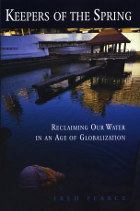
Water has long been the object of political ambition and conflict. Recent history is full of leaders who tried to harness water to realize national dreams. Yet the people who most need water-farmers, rural villages, impoverished communities-are too often left, paradoxically, with desiccated fields, unfulfilled promises, and refugee status.
It doesn't have to be this way, according to Fred Pearce. A veteran science news correspondent, Pearce has for over fifteen years chronicled the development of large-scale water projects like China's vast Three Gorges dam and India's Sardar Sarovar. But, as he and numerous other authors have pointed out, far from solving our water problems, these industrial scale projects, and others now in the planning, are bringing us to the brink of a global water crisis.
Pearce decided there had to be a better way.
To find it, he traveled the globe in search of alternatives to mega-engineering projects. In Keepers of the Spring, he brings back intriguing stories from people like Yannis Mitsis, an ethnic Greek Cypriot, who is the last in his line to know the ways and whereabouts of a network of underground tunnels that have for centuries delivered to farming communities the water they need to survive on an arid landscape. He recounts the inspiring experiences of small-scale water stewards like Kenyan Jane Ngei, who reclaimed for her people a land abandoned by her government as a wasteland. And he tells of many others who are developing new techniques and rediscovering ancient ones to capture water for themselves.
In so doing, Pearce documents that these "keepers" are not merely isolated examples, but collectively constitute an entire alternative tradition of working with natural flows rather than trying to reengineer nature to provide water for human needs.
The solution to our water problems, he finds, may not lie in new technologies-though they will play a role-but in recovering ancient traditions, using water more efficiently, and better understanding local hydrology. Are these approaches adequate to serve the world's growing populations? The answer remains unclear. But we ignore them at our own peril.
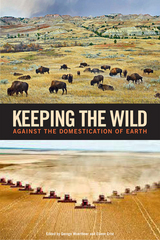
In Keeping the Wild, a group of prominent scientists, writers, and conservation activists responds to the Anthropocene-boosters who claim that wild nature is no more (or in any case not much worth caring about), that human-caused extinction is acceptable, and that “novel ecosystems” are an adequate replacement for natural landscapes. With rhetorical fists swinging, the book’s contributors argue that these “new environmentalists” embody the hubris of the managerial mindset and offer a conservation strategy that will fail to protect life in all its buzzing, blossoming diversity.
With essays from Eileen Crist, David Ehrenfeld, Dave Foreman, Lisi Krall, Harvey Locke, Curt Meine, Kathleen Dean Moore, Michael Soulé, Terry Tempest Williams and other leading thinkers, Keeping the Wild provides an introduction to this important debate, a critique of the Anthropocene boosters’ attack on traditional conservation, and unapologetic advocacy for wild nature.
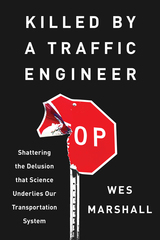
Fixing the carnage on our roadways requires a change in mindset and a dramatic transformation of transportation. This goes for traffic engineers in particular because they are still the ones in charge of our streets.
In Killed by a Traffic Engineer, civil engineering professor Wes Marshall shines a spotlight on how little science there is behind the way that our streets are engineered, which leaves safety as an afterthought. While traffic engineers are not trying to cause deliberate harm to anyone, he explains, they are guilty of creating a transportation system whose designs remain largely based on plausible, but unproven, conjecture.
Thoroughly researched and compellingly written, Killed by a Traffic Engineer shows how traffic engineering “research” is outdated and unexamined (at its best) and often steered by an industry and culture considering only how to get from point A to B the fastest way possible, to the detriment of safety, quality of life, equality, and planetary health. Marshall examines our need for speed and how traffic engineers disconnected it from safety, the focus on capacity and how it influences design, blaming human error, relying on faulty data, how liability drives reporting, measuring road safety outcomes, and the education (and reeducation) of traffic engineers.
Killed by a Traffic Engineer is ultimately hopeful about what is possible once we shift our thinking and demand streets engineered for the safety of people, both outside and inside of cars. It will make you look at your city and streets—and traffic engineers— in a new light and inspire you to take action.
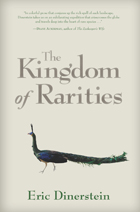
An eye-opening tour of the rare and exotic, The Kingdom of Rarities offers us a new understanding of the natural world, one that places rarity at the center of conservation biology. Looking at real-time threats to biodiversity, from climate change to habitat fragmentation, and drawing on his long and distinguished scientific career, Dinerstein offers readers fresh insights into fascinating questions about the science of rarity and unforgettable experiences from the field.

Kinship to Mastery is a fascinating and accessible exploration of the notion of biophilia -- the idea that humans, having evolved with the rest of creation, possess a biologically based attraction to nature and exhibit an innate affinity for life and lifelike processes. Stephen R. Kellert sets forth the idea that people exhibit different expressions of biophilia in different contexts, and demonstrates how our quality of life in the largest sense is dependent upon the richness of our connections with nature.
While the natural world provides us with material necessities -- food, clothing, medicine, clean air, pure water -- it just as importantly plays a key role in other aspects of our lives, including intellectual capacity, emotional bonding, aesthetic attraction, creativity, imagination, and even the recognition of a just and purposeful existence. As Kellert explains, each expression of biophilia shows how our physical, material, intellectual, emotional, and spiritual well-being is to a great extent dependent on our relationships with the natural world that surrounds us.
Kinship to Mastery is a thought-provoking examination of a concept that, while not widely known, has a significant and direct effect on the lives of people everywhere. Because the full expression of biophilia is integral to our overall health, our ongoing destruction of the environment could have far more serious consequences than many people think. In a readable and compelling style, Kellert describes and explains the concept of biophilia, and demonstrates to a general audience the wide-ranging implications of environmental degradation.
Kinship to Mastery continues the exploration of biophilia begun with Edward O. Wilson's landmark book Biophilia (Harvard University Press, 1984) and followed by The Biophilia Hypothesis (Island Press, 1993), co-edited by Wilson and Kellert, which brought together some of the most creative scientists of our time to explore Wilson's theory in depth.

Ann Vileisis’s answer is a sensory-rich journey through the history of making dinner. Kitchen Literacy takes us from an eighteenth-century garden to today’s sleek supermarket aisles, and eventually to farmer’s markets that are now enjoying a resurgence. Vileisis chronicles profound changes in how American cooks have considered their foods over two centuries and delivers a powerful statement: what we don’t know could hurt us.
As the distance between farm and table grew, we went from knowing particular places and specific stories behind our foods’ origins to instead relying on advertisers’ claims. The woman who raised, plucked, and cooked her own chicken knew its entire life history while today most of us have no idea whether hormones were fed to our poultry. Industrialized eating is undeniably convenient, but it has also created health and environmental problems, including food-borne pathogens, toxic pesticides, and pollution from factory farms.
Though the hidden costs of modern meals can be high, Vileisis shows that greater understanding can lead consumers to healthier and more sustainable choices. Revealing how knowledge of our food has been lost and how it might now be regained, Kitchen Literacy promises to make us think differently about what we eat.
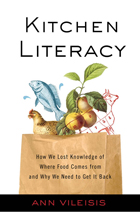
Ann Vileisis’s answer is a sensory-rich journey through the history of making dinner. Kitchen Literacy takes us from an eighteenth-century garden to today’s sleek supermarket aisles, and eventually to farmer’s markets that are now enjoying a resurgence. Vileisis chronicles profound changes in how American cooks have considered their foods over two centuries and delivers a powerful statement: what we don’t know could hurt us.
As the distance between farm and table grew, we went from knowing particular places and specific stories behind our foods’ origins to instead relying on advertisers’ claims. The woman who raised, plucked, and cooked her own chicken knew its entire life history while today most of us have no idea whether hormones were fed to our poultry. Industrialized eating is undeniably convenient, but it has also created health and environmental problems, including food-borne pathogens, toxic pesticides, and pollution from factory farms.
Though the hidden costs of modern meals can be high, Vileisis shows that greater understanding can lead consumers to healthier and more sustainable choices. Revealing how knowledge of our food has been lost and how it might now be regained, Kitchen Literacy promises to make us think differently about what we eat.
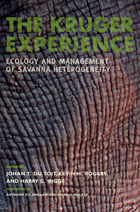
Kruger National Park in South Africa has one of the most extensive sets of records of any protected area in the world, and throughout its history has supported connections between science and management. In recognition of that long-standing tradition comes The Kruger Experience, the first book to synthesize/summarize a century of ecological research and management in two million hectares of African savanna.
The Kruger Experience places the scientific and management experience in Kruger within the framework of modern ecological theory and its practical applications. The book uses a cross-cutting theme of ecological heterogeneity -- the idea that ecological systems function across a full hierarchy of physical and biological components, processes, and scales, in a dynamic space-time mosaic. Contributors, who include many esteemed ecologists who have worked in Kruger in recent years, examine a range of topics covering broad taxonomic groupings and ecological processes. The book's four sections explore:
- the historical context of research and management in Kruger, the theme of heterogeneity, and the current philosophy in Kruger for linking science with management
- the template of natural components and processes, as influenced by management, that determine the present state of the Kruger ecosystem
- how species interact within the ecosystem to generate further heterogeneity across space and time
- humans as key components of savanna ecosystems
In addition to the editors, contributors include William J. Bond, Jane Lubchenco, David Mabunda, Michael G.L. ("Gus") Mills, Robert J. Naiman, Norman Owen-Smith, Steward T.A. Pickett, Stuart L. Pimm, and Rober J. Scholes.
The book is an invaluable new resource for scientists and managers involved with large, conserved ecosystems as well as for conservation practitioners and others with interests in adaptive management, the societal context of conservation, links between research and management in parks, and parks/academic partnerships.
READERS
Browse our collection.
PUBLISHERS
See BiblioVault's publisher services.
STUDENT SERVICES
Files for college accessibility offices.
UChicago Accessibility Resources
home | accessibility | search | about | contact us
BiblioVault ® 2001 - 2024
The University of Chicago Press









